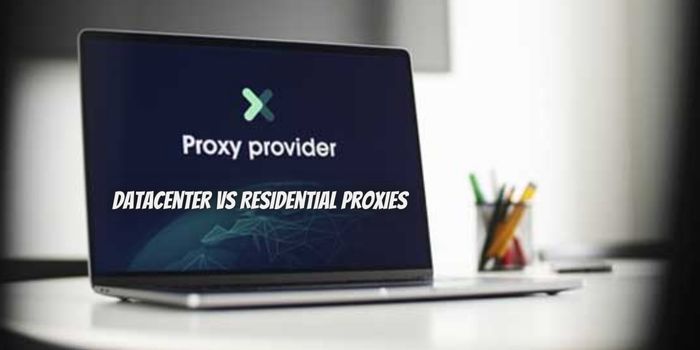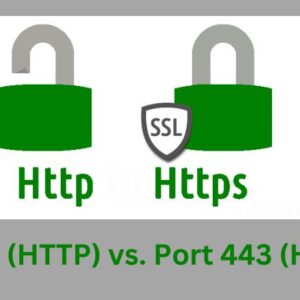A proxy or proxy server is a hardware- or software-based gateway between a web client (browser) or user’s computer and a web server. There are different proxy types, which differ based on several parameters, including the direction of traffic routing, the type of assigned IP address, and the communication protocol used. In this article, we’ll focus on datacenter vs residential proxies, which fall into the type of assigned IP address category. Let’s get started.
Datacenter Proxies
A datacenter proxy assigns datacenter IP addresses registered to data center companies and cloud solutions providers. As such, this proxy type routes traffic through powerful data center servers. As we have discussed later, this has an advantage, making datacenter proxies ideal for tasks requiring fast response times.
However, it has a disadvantage because some web servers are weary of requests that are linked to data centers. Often, the server is configured to associate such requests with bots, which are capable of sending hundreds of concurrent requests, which can be overwhelming. The problem is further compounded if shared datacenter proxies are used.
By sharing the bandwidth and server infrastructure, users don’t have full control over the number of requests that are routed through the proxy. If a large number of users send connection requests to the same website, the web server may flag the network activity, which can lead to a ban if the issue persists.
Fortunately, you can avoid IP bans by using dedicated datacenter proxies. This proxy type assigns every user a unique IP address, giving each of them complete control of their respective server. As such, the user gets to use 100% of the bandwidth and server infrastructure. Plus, they can control the number of requests routed through the server, reducing the likelihood of getting blacklisted. Unfortunately, though dedicated datacenter proxies offer a buffer against IP bans, they cannot compare to residential proxies, which are superior because they’re associated with real users rather than data centers.
Residential Proxies
A residential proxy is an intermediary that assigns residential IP addresses to its users. These residential IP addresses are associated with or belong to home internet service providers (ISPs). In this regard, this proxy type routes internet traffic through real users’ personal computers rather than data center servers. It’s this fact and the resultant reliability that make residential proxies superior to datacenter proxies.
Typically, any request channeled through a residential proxy is deemed to have been sent by a real human being rather than a bot, even when a bot has sent it. Thus, a web server cannot easily block the judgment on whether or not there is a bot isn’t clear-cut. This is, however, not the case with datacenter proxies, which are commonly used by bots.
Factors to Consider when Choosing Between Datacenter and Residential Proxies
What factors should you consider when deciding what’s better for you: datacenter vs residential proxies? Here are the considerations you should make:
-
Cost
Datacenter proxies are cheaper than residential proxies.
-
Speed and performance
Datacenter proxies are faster and have better performance than residential proxies. This is because the former routes traffic through powerful data center servers, while the latter passes the web requests and responses through regular consumer computers.
-
Anonymity
While both datacenter and residential proxies mask the real IP address, the latter offers greater online anonymity. This is because datacenter IP addresses are easily recognized as such. And given that some servers are configured to associate requests originating from data centers as with bot activity, datacenter proxies don’t offer the much-needed buffer. In contrast, residential proxies provide complete anonymity, so much so that bots are considered real human users.
-
Reliability
Datacenter proxies are easily flagged for bot activity, with their associated IP addresses blacklisted if a web server detects unusual activity. For this reason, datacenter proxies are less reliable. On the other hand, residential proxies and their associated IP addresses aren’t easily flagged or banned. This means that this proxy type offers unmatched reliability.
-
IP network pool and locations
Residential proxies have a wider IP network pool than datacenter proxies. This is advantageous, especially because the IP addresses in the pool can be rotated periodically, thus preventing IP blocking and boosting reliability even further.
-
Use case
Datacenter proxies are preferred for tasks that require high response times and those that need high processing power, such as video streaming. They’re also ideal for light web scraping, wherein the number of requests is minimal. Residential proxies are preferred when undertaking large-scale web scraping.
Click here now to read a great blog post if you’re interested to learn more.
Conclusion
Datacenter and residential proxies are markedly different in how they operate, primarily because of the type of IP address assigned. However, they’re also different in many other ways based on their inherent characteristics and individual strengths and weaknesses. Therefore, when choosing between a datacenter vs residential proxies, you should consider these characteristics as well as factors such as cost, reliability, IP network pool, speed and performance, and the use case.
Related posts:




